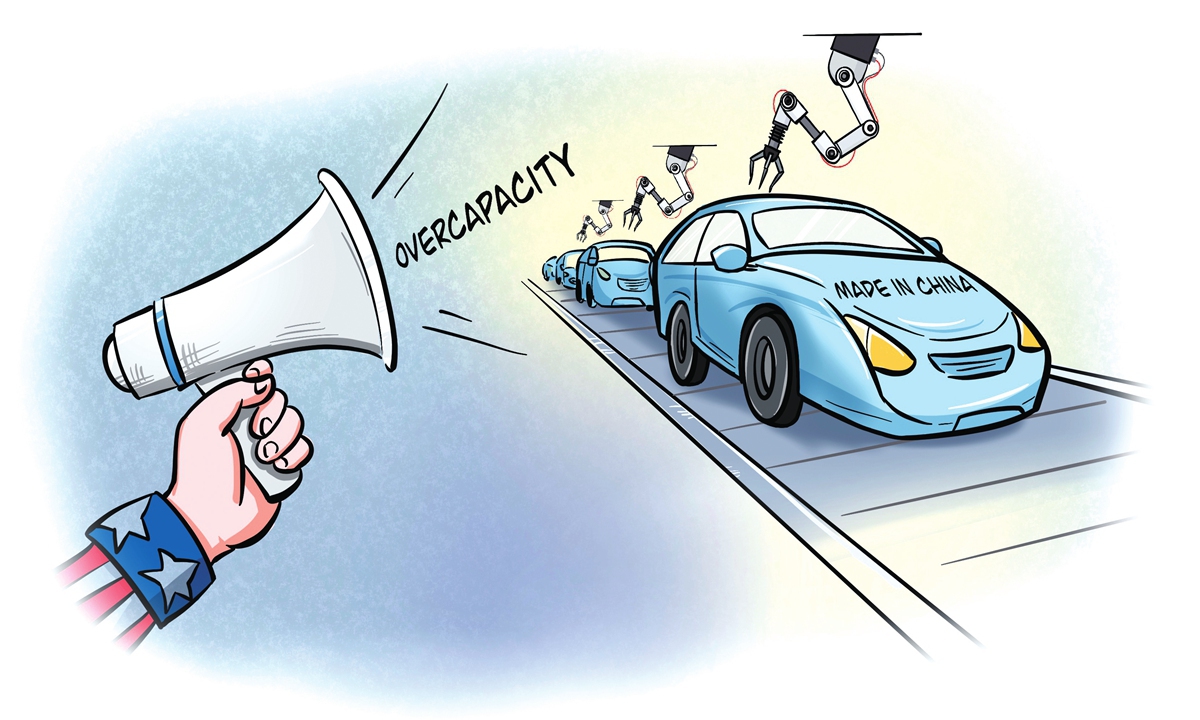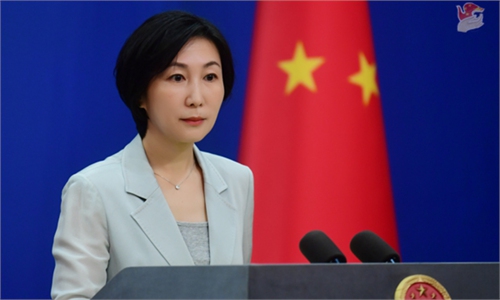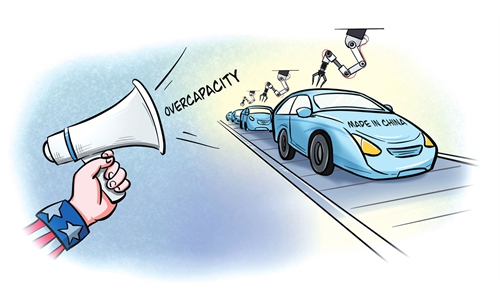Western ‘overcapacity’ rhetoric lacks logic, aimed at stymieing China’s development

Illustration: Liu Xidan/Global Times
During her visit to China last week, US Treasury Secretary Janet Yellen expressed concern about China's "overcapacity" in some industrial sectors and its potential impact on American workers and businesses, saying that the US government will push for changes in China's industrial policy.Despite Yellen appearing to be a dovish US official toward China and her reassurances during her visit that the US will not decouple from China, her tough remarks over "overcapacity" sparked widespread concern.
First and foremost, the Chinese side has repeatedly made well-founded rebuttals of Western countries' accusations of "subsidies," "overcapacity" and harsh rhetoric about China's trade and industrial policy.
Chinese Foreign Ministry spokesperson Mao Ning on Tuesday responded to the US allegation that China's new-energy sector faces the problem of "overcapacity," saying that politicizing trade issues by such means as hyping production "overcapacity" goes against economic laws.
It is not conducive to the domestic industry in the US and will disturb world economic stability.
The economic problem facing the US and the European countries is insufficient supply and rising demand. However, China has perfectly strong manufacturing capabilities and supply competitiveness.
Bluntly put, Western countries are at a disadvantage in manufacturing competition, but they refuse to admit the fact that they cannot compete with China. Instead, they accuse China of unfair trade practices, claiming that China is subsidizing its industries in violation of market competition rules. This tactic is known as talking tough to seize the initiative.
While not acknowledging China's current competitive edge, some Western countries are criticizing China, implying that there may be some potential moves coming. However, in Western countries such as the US, subsidies have already been provided in large amounts for some industries, and these countries are seeing a growing trend toward protectionism.
Rational Western experts have pointed out that if the US launches a green trade war against China, it would be harmful to both the Chinese and American economies, as well as the global economy.
For instance, in an article headlined "Yellen heads to China to fight a green trade war the US may not win," US-based Marketwatch.com wrote that while US President Joe Biden hasn't renounced his predecessor's trade war against China, Yellen's visit shows that the battlefield has shifted.
Economists warn that when the US is pushing aggressive new subsidies for semiconductor manufacturing and green technologies, it may not win the green trade war it's fighting against China, according to the report.
If the US suppresses China's competitiveness in green trade, it is undermining the balance of the world economy. Western countries claim to advocate for the balance of the world economy, and true balance in the world economy means breaking down trade protectionism.
Western countries, led by the US, should fully respect the industrial advantages of other countries and adhere to the rules of free trade. Each country has its industrial advantages.
China's manufacturing capabilities and competitive advantages are more obvious in green new-energy and environmentally friendly products. This situation is driven by the objective needs of the market, not because the government has any distorted policies at all.
The current actions of Western countries show that they do not understand China, or that they are deliberately trying to undermine the economic development achievements of China.
With new-energy products represented by the "new three items," China's related industries have formed a strong competitive advantage internationally, becoming a new driving force leading economic growth. Therefore, Western countries criticize these industries in China and warn of taking corresponding measures.
However, if Western countries really take similar measures, it will harm their own economies and industries. On the one hand, it will hinder their countries' efforts in tackling climate change, while on the other, it will not be conducive to the development of their businesses and industries in the longer term.
Global carbon emission reduction efforts have been effective. Countries also hope to jointly maintain a good trade and investment environment to promote the quick recovery of the global economy. This recovery plays a positive role in further achieving emissions reduction goals globally.
Western countries claim to support the market economy, so they should not impose political interference on free trade. They also have no right to prevent Chinese companies from engaging in normal international market competition.
Western countries should stop saying one thing and doing another, on the one hand claiming to encourage fair market competition and on the other hand constantly suppressing Chinese industries that have competitive advantages.
This contradiction fully shows that Western countries can use any means to maintain their national interests.
The author is a vice chairman of the China Society for World Trade Organization Studies in Beijing. bizopinion@globaltimes.com.cn



